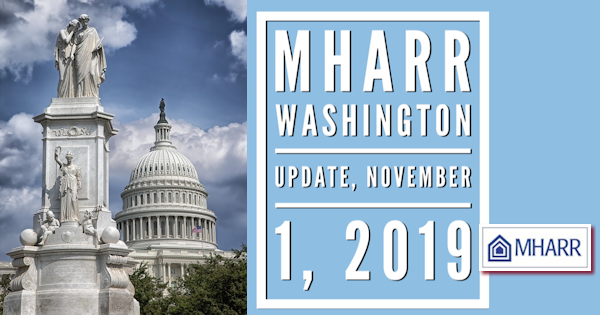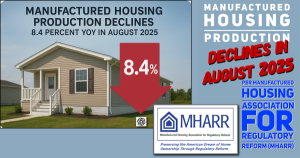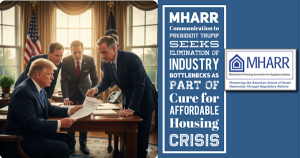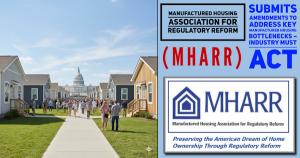MHARR Washington Update November 1, 2019- MHCC Being Undermined by HUD Manipulation, FHFA Shocker: GSEs “In Compliance” With Gutted DTS!

MHCC UNDERMINED BY ONGOING FAILURE TO COMPLY WITH LAW
The statutory Manufactured Housing Consensus Committee (MHCC) held its most recent in-person meeting in Washington, D.C. from October 29-31, 2019. While the Committee approved and recommended to HUD several potentially significant proposed regulatory reforms – including reforms proposed by and/or supported by MHARR – the MHCC, which was designed by Congress to be an independent safeguard against regulatory abuses by the HUD manufactured housing program, is on a steep trajectory toward de facto HUD domination, like the impotent Manufactured Housing Advisory Council eliminated by Congress in the Manufactured Housing Improvement Act of 2000.
Indeed, there is rapidly-mounting evidence that the MHCC and the MHCC process are being distorted and manipulated in the absence of a fully-accountable, appointed non-career manufactured housing program administrator, and are dangerously out-of-step with the regulatory reform policies of both President Trump and Secretary Carson as entrenched interests seek to “run out the clock” on those policies. Among other things, this manipulation is being advanced and facilitated by: (1) HUD’s refusal, dating back to the Obama Administration, to appoint staff from the industry’s collective national associations (i.e., the Manufactured Housing Institute and MHARR – which together represent virtually all regulated parties) to provide the type of institutional memory, knowledge, know-how and experience that is needed to produced fully-informed decisions on a host of complex issues; and (2) increasingly extreme and baseless restrictions of the participation of such staff as supposed “members of the public,” with non-Committee members now limited to two minutes of speaking time at the beginning and end of each day during a meeting which saw well more than 200 regulatory reform and technical proposals considered and decided.
In short, the MHCC process, through total HUD control of MHCC-member selections, the elimination of collective industry representation (while other interests, such as consumers) continue to enjoy collective representation – and fundamentally lawless Obama-era limitations on the types of matters brought to the MHCC — is being intentionally and severely downgraded to produce poorly-informed decisions, degrade the role and functionality of the MHCC, and simultaneously enhance the power of HUD program regulators and contractors to the detriment of lower and moderate-income homebuyers and smaller, independent industry businesses.
This hijacking of the MHCC process is in complete violation of Trump Administration regulatory reform policies and Executive Orders, but is able to escape any type of accountability or effective policy oversight within HUD due to the apparent disinterest of appointed officials below the level of the Secretary with supposed oversight of the program. The resulting vacuum in political accountability has allowed a culture of institutional resistance to the program reforms of the 2000 law – including a legitimate, independent, functional and non-biased MHCC — to once again flourish.
This, in turn, has needlessly delayed, for two decades, the full implementation of significant 2000 law program reforms, including its two most important mandates, i.e.— (1) the failure to appoint a non-career program administrator, which has disconnected the operation of the program from the highest policy-making levels of HUD and the Administration, negatively impacting its day-to-day operations and policies as well as efforts to include mainstream HUD Code manufactured housing in government housing programs; and (2) the ongoing failure to select a new program “monitoring” contractor after more than 40 years of non-competitive contract solicitations and contract awards to the same entrenched entity.
Despite this activity to destroy the independence, role and functionality of the MHCC and the MHCC process, a number of MHARR regulatory reform proposals and MHARR-supported reform proposals were adopted by the full MHCC and will be forwarded to HUD for further action under Trump Administration Executive Orders (EOs) 13771 and 13777. These include but are not limited to —
(1) De-Regulatory Comments (DRC) 219 and 77: These MHARR proposals call for the withdrawal of all HUD “Field Guidance” memoranda and similar sub-regulatory mandates (including all aspects of HUD’s program of expanded in-plant regulation) which were not submitted in advance to the MHCC for review and published by HUD for notice and comment as required by section 604 of the 2000 reform law, U.S. Justice Department opinions issued in 2017 and 2018, and Executive Orders issued on October 9, 2019, which provide that federal agencies may not enforce supposed requirements set forth solely in “guidance” documents or other materials not been published for notice and comment under the federal Administrative Procedure Act (APA) or other applicable law (i.e., section 604 of the 2000 reform law).
(2) Subpart I Reform: Consistent with MHARR DRC-26, the full MHCC approved and forwarded to HUD a proposal developed by the MHCC’s Regulatory Enforcement Subcommittee to further reform HUD’s Subpart I Consumer Complaint Handling regulations (24 C.F.R. 3282.401, etseq.) to more closely align with section 615 of the National Manufactured Housing Construction and Safety Standards Act of 1974 (as amended), the authorizing portion of the law for Subpart I, and eliminate mandates that are not supported by the express terms of that statute. Among other things, the proposal would completely eliminate the current Subpart I response category of “serious defects,” which trigger significant investigatory, paperwork and other response obligations by manufacturers, but are not addressed at all by section 615.
(3) On-Site Completion Reform: Consistent with MHARR DRC-17 and 89 calling for the repeal of HUD’s overly complex and needlessly burdensome and costly “on-site completion” rule, the MHCC’s Regulatory Enforcement Subcommittee began – and made significant progress on — the development of a proposal to simplify inspection and certification procedures for manufactured homes completed on-site. While the Subcommittee was not able to finish final revisions to this proposal so that it could be considered by the full MHCC at the current meeting, this significant proposal is being advanced for completion and further action in the near future.
Additional significant details regarding the MHCC meeting, other MHARR regulatory reform proposals and the status of the federal program will be addressed by MHARR soon.
SHOCKING FHFA APPROVAL OF GSEs’ DTS PROGRAMS!
Exactly one day after Fannie Mae, in a report published by the Federal Housing Finance Agency (FHFA), requested FHFA approval to totally eliminate its already miniscule commitment to purchase manufactured housing real-estate loans under its 2018-2020 Duty to Serve Underserved Markets (DTS) “Implementation Plan” and to reduce its aspirational purchase “goal” for such loans to practically nothing, FHFA, in a further report to Congress, shockingly declared that both Fannie Mae and Freddie Mac have “complied” with their DTS undertakings “in all three underserved markets.” The FHFA report, instead, found that Fannie and Freddie “performed a satisfactory job of increasing the liquidity and distribution of available capital in each of the three underserved markets.” It is thus apparent that the alleged “implementation” of DTS by Fannie Mae and Freddie Mac has now yielded two distinct and inexcusable failures – the failure of the two Government Sponsored Enterprises (GSEs) to implement DTS within the mainstream, existing manufactured housing market in any meaningful manner, and now the parallel failure of the GSEs’ federal regulator to ensure the proper and legitimateimplementation of the DTS mandate within the HUD Code manufactured housing market. This not only hurts consumers and the industry as a whole, but completely disrespects the will and design of Congress in establishing the DTS mandate.
Put differently, it is astounding – and sadly ironic – that FHFA would make such a transparently false and misleading claim immediately on the heels of Fannie Mae’s request to effectively gut its already pitiful commitment to mainstream HUD Code home loan purchases more than a decade after DTS was enacted by Congress. This unfortunately illustrates and confirms, as MHARR has long maintained, that the entire supposed 11-year DTS implementation “process,” has been a farce designed to create an “illusion of motion,” that the GSEs have no real interest in serving the mainstream HUD Code manufactured housing market, and that both Houses of Congress should initiate a full investigation and hearings into the failure of the GSEs and FHFA, as their federal regulator, to fully implement DTS on a market-significant basis for the lower and moderate-income Americans who rely on affordable, mainstream HUD Code manufactured housing.
Nor should any of this come as a surprise to either the industry or FHFA. Although the joint failure of the GSEs and FHFA on the implementation of DTS within the manufactured housing market long pre-dates the arrival of current FHFA Director, Dr. Mark Calabria, MHARR, when it met with the new Director just three months ago, fully-explained the history of this matter and explained that the erstwhile “implementation” of DTS was – and long has been – on the “wrong track,” as illustrated by the diversion of DTS, by both Fannie and Freddie, into higher-cost non-mainstream manufactured housing through their respective “MH Advantage” programs. And while the GSEs have used those programs as an excuse and ruse to avoid and continue delaying any type of support for mainstream HUD Code manufactured housing market, both Fannie Mae and FHFA complain about a lack of originations within those programs. How could such a lack of activity possibly be surprising, however, when the nearly identical “MH Select” program failed to produce any originations long before DTS?
While Director Calabria, who appears to be well-intended, promised that this matter would be fully reviewed, it is apparent that his arrival is simply too late to correct the multitude of failures that have accumulated to date with respect to DTS. Instead, these latest developments support, underscore and vindicate MHARR’s long-held view that the GSEs’ simply do not want to serve mainstream manufactured housing and mainstream manufactured housing consumers, and are unwilling to move outside of their “comfort zone” as demonstrated by their effort – with FHFA as their witting or unwitting accomplice – to divert DTS, through “MH Select” to a more costly and more affluent market for homes that by their own definition are more like site-built homes. It is thus obvious and has been obvious for years, that the GSEs, rather than change their ownapproach to manufactured housing — which is what Congress designed DTS to do — are instead trying to change the product, the market and the law itself to the benefit of a few high-cost interest rate lenders and the simultaneous extreme detriment of smaller independent producers and the vast bulk of mainstream manufactured homebuyers.
Congressional oversight, consequently, is essential to put DTS back on track to deliver the relief and remedy that it was originally designed by Congress to produce for American consumers of affordable housing. There has been more than enough evasion, misdirection and distraction. The time has come for the entire industry – and for consumers of affordable mainstream manufactured housing — to demand meaningful action.
MHCC UNDERMINED BY ONGOING FAILURE TO COMPLY WITH LAW
The statutory Manufactured Housing Consensus Committee (MHCC) held its most recent in-person meeting in Washington, D.C. from October 29-31, 2019. While the Committee approved and recommended to HUD several potentially significant proposed regulatory reforms – including reforms proposed by and/or supported by MHARR – the MHCC, which was designed by Congress to be an independent safeguard against regulatory abuses by the HUD manufactured housing program, is on a steep trajectory toward de facto HUD domination, like the impotent Manufactured Housing Advisory Council eliminated by Congress in the Manufactured Housing Improvement Act of 2000.
Indeed, there is rapidly-mounting evidence that the MHCC and the MHCC process are being distorted and manipulated in the absence of a fully-accountable, appointed non-career manufactured housing program administrator, and are dangerously out-of-step with the regulatory reform policies of both President Trump and Secretary Carson as entrenched interests seek to “run out the clock” on those policies. Among other things, this manipulation is being advanced and facilitated by: (1) HUD’s refusal, dating back to the Obama Administration, to appoint staff from the industry’s collective national associations (i.e., the Manufactured Housing Institute and MHARR – which together represent virtually all regulated parties) to provide the type of institutional memory, knowledge, know-how and experience that is needed to produced fully-informed decisions on a host of complex issues; and (2) increasingly extreme and baseless restrictions of the participation of such staff as supposed “members of the public,” with non-Committee members now limited to two minutes of speaking time at the beginning and end of each day during a meeting which saw well more than 200 regulatory reform and technical proposals considered and decided.
In short, the MHCC process, through total HUD control of MHCC-member selections, the elimination of collective industry representation (while other interests, such as consumers) continue to enjoy collective representation – and fundamentally lawless Obama-era limitations on the types of matters brought to the MHCC — is being intentionally and severely downgraded to produce poorly-informed decisions, degrade the role and functionality of the MHCC, and simultaneously enhance the power of HUD program regulators and contractors to the detriment of lower and moderate-income homebuyers and smaller, independent industry businesses.
This hijacking of the MHCC process is in complete violation of Trump Administration regulatory reform policies and Executive Orders, but is able to escape any type of accountability or effective policy oversight within HUD due to the apparent disinterest of appointed officials below the level of the Secretary with supposed oversight of the program. The resulting vacuum in political accountability has allowed a culture of institutional resistance to the program reforms of the 2000 law – including a legitimate, independent, functional and non-biased MHCC — to once again flourish.
This, in turn, has needlessly delayed, for two decades, the full implementation of significant 2000 law program reforms, including its two most important mandates, i.e.— (1) the failure to appoint a non-career program administrator, which has disconnected the operation of the program from the highest policy-making levels of HUD and the Administration, negatively impacting its day-to-day operations and policies as well as efforts to include mainstream HUD Code manufactured housing in government housing programs; and (2) the ongoing failure to select a new program “monitoring” contractor after more than 40 years of non-competitive contract solicitations and contract awards to the same entrenched entity.
Despite this activity to destroy the independence, role and functionality of the MHCC and the MHCC process, a number of MHARR regulatory reform proposals and MHARR-supported reform proposals were adopted by the full MHCC and will be forwarded to HUD for further action under Trump Administration Executive Orders (EOs) 13771 and 13777. These include but are not limited to —
(1) De-Regulatory Comments (DRC) 219 and 77: These MHARR proposals call for the withdrawal of all HUD “Field Guidance” memoranda and similar sub-regulatory mandates (including all aspects of HUD’s program of expanded in-plant regulation) which were not submitted in advance to the MHCC for review and published by HUD for notice and comment as required by section 604 of the 2000 reform law, U.S. Justice Department opinions issued in 2017 and 2018, and Executive Orders issued on October 9, 2019, which provide that federal agencies may not enforce supposed requirements set forth solely in “guidance” documents or other materials not been published for notice and comment under the federal Administrative Procedure Act (APA) or other applicable law (i.e., section 604 of the 2000 reform law).
(2) Subpart I Reform: Consistent with MHARR DRC-26, the full MHCC approved and forwarded to HUD a proposal developed by the MHCC’s Regulatory Enforcement Subcommittee to further reform HUD’s Subpart I Consumer Complaint Handling regulations (24 C.F.R. 3282.401, etseq.) to more closely align with section 615 of the National Manufactured Housing Construction and Safety Standards Act of 1974 (as amended), the authorizing portion of the law for Subpart I, and eliminate mandates that are not supported by the express terms of that statute. Among other things, the proposal would completely eliminate the current Subpart I response category of “serious defects,” which trigger significant investigatory, paperwork and other response obligations by manufacturers, but are not addressed at all by section 615.
(3) On-Site Completion Reform: Consistent with MHARR DRC-17 and 89 calling for the repeal of HUD’s overly complex and needlessly burdensome and costly “on-site completion” rule, the MHCC’s Regulatory Enforcement Subcommittee began – and made significant progress on — the development of a proposal to simplify inspection and certification procedures for manufactured homes completed on-site. While the Subcommittee was not able to finish final revisions to this proposal so that it could be considered by the full MHCC at the current meeting, this significant proposal is being advanced for completion and further action in the near future.
Additional significant details regarding the MHCC meeting, other MHARR regulatory reform proposals and the status of the federal program will be addressed by MHARR soon.
SHOCKING FHFA APPROVAL OF GSEs’ DTS PROGRAMS!
Exactly one day after Fannie Mae, in a report published by the Federal Housing Finance Agency (FHFA), requested FHFA approval to totally eliminate its already miniscule commitment to purchase manufactured housing real-estate loans under its 2018-2020 Duty to Serve Underserved Markets (DTS) “Implementation Plan” and to reduce its aspirational purchase “goal” for such loans to practically nothing, FHFA, in a further report to Congress, shockingly declared that both Fannie Mae and Freddie Mac have “complied” with their DTS undertakings “in all three underserved markets.” The FHFA report, instead, found that Fannie and Freddie “performed a satisfactory job of increasing the liquidity and distribution of available capital in each of the three underserved markets.” It is thus apparent that the alleged “implementation” of DTS by Fannie Mae and Freddie Mac has now yielded two distinct and inexcusable failures – the failure of the two Government Sponsored Enterprises (GSEs) to implement DTS within the mainstream, existing manufactured housing market in any meaningful manner, and now the parallel failure of the GSEs’ federal regulator to ensure the proper and legitimate implementation of the DTS mandate within the HUD Code manufactured housing market. This not only hurts consumers and the industry as a whole, but completely disrespects the will and design of Congress in establishing the DTS mandate.
Put differently, it is astounding – and sadly ironic – that FHFA would make such a transparently false and misleading claim immediately on the heels of Fannie Mae’s request to effectively gut its already pitiful commitment to mainstream HUD Code home loan purchases more than a decade after DTS was enacted by Congress. This unfortunately illustrates and confirms, as MHARR has long maintained, that the entire supposed 11-year DTS implementation “process,” has been a farce designed to create an “illusion of motion,” that the GSEs have no real interest in serving the mainstream HUD Code manufactured housing market, and that both Houses of Congress should initiate a full investigation and hearings into the failure of the GSEs and FHFA, as their federal regulator, to fully implement DTS on a market-significant basis for the lower and moderate-income Americans who rely on affordable, mainstream HUD Code manufactured housing.
Nor should any of this come as a surprise to either the industry or FHFA. Although the joint failure of the GSEs and FHFA on the implementation of DTS within the manufactured housing market long pre-dates the arrival of current FHFA Director, Dr. Mark Calabria, MHARR, when it met with the new Director just three months ago, fully-explained the history of this matter and explained that the erstwhile “implementation” of DTS was – and long has been – on the “wrong track,” as illustrated by the diversion of DTS, by bothFannie and Freddie, into higher-cost non-mainstream manufactured housing through their respective “MH Advantage” programs. And while the GSEs have used those programs as an excuse and ruse to avoid and continue delaying any type of support for mainstream HUD Code manufactured housing market, both Fannie Mae and FHFA complain about a lack of originations within those programs. How could such a lack of activity possibly be surprising, however, when the nearly identical “MH Select” program failed to produce any originations long before DTS?
While Director Calabria, who appears to be well-intended, promised that this matter would be fully reviewed, it is apparent that his arrival is simply too late to correct the multitude of failures that have accumulated to date with respect to DTS. Instead, these latest developments support, underscore and vindicate MHARR’s long-held view that the GSEs’ simply do not want to serve mainstream manufactured housing and mainstream manufactured housing consumers, and are unwilling to move outside of their “comfort zone” as demonstrated by their effort – with FHFA as their witting or unwitting accomplice – to divert DTS, through “MH Select” to a more costly and more affluent market for homes that by their own definition are more like site-built homes. It is thus obvious and has been obvious for years, that the GSEs, rather than change their own approach to manufactured housing — which is what Congress designed DTS to do — are instead trying to change the product, the market and the law itself to the benefit of a few high-cost interest rate lenders and the simultaneous extreme detriment of smaller independent producers and the vast bulk of mainstream manufactured homebuyers.
Congressional oversight, consequently, is essential to put DTS back on track to deliver the relief and remedy that it was originally designed by Congress to produce for American consumers of affordable housing. There has been more than enough evasion, misdirection and distraction. The time has come for the entire industry – and for consumers of affordable mainstream manufactured housing — to demand meaningful action.












